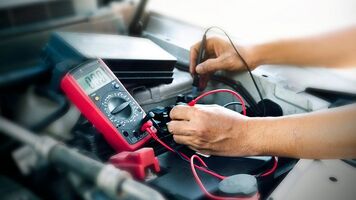How you can "kill" a generator: the most common mistakes
The word generator comes from the Latin generator (manufacturer) and is a unit that converts mechanical energy into electrical energy, providing a constant and continuous charge of the battery when the engine is running, as well as supplying power when the engine is started, when the starter consumes a large amount of electricity. However, there are several simple ways to "sentence" the generator by making any of the following mistakes.
Lack of attention to the battery
Often, many components of a car fail from banal inattention, namely, unwillingness to at least occasionally raise the hood and watch what is happening in the engine compartment. In this situation, it is quite possible to overlook that you are operating a car with a faulty or weakened terminal, or, as they say, with a bad or missing weight. "
Because of this, the generator starts to work under heavy load, does not give out the declared voltage and warms up to abnormal temperatures.
Equally often, problems with the generator arise when you use an old or damaged battery, in one or more "cells" of which there is a short circuit. In this case, the "gene" becomes a powerful parasitic load in the generator circuit. It again begins to overheat and sooner or later fails - the relay-regulator, the diode bridge, the rotor and stator winding burn out. And it also happens - you give a "light" to your neighbor in the parking lot, and at this moment the engine of your car is running.
In this case, the alternator and power ECU will receive extreme stress from the starter motor of the second vehicle, and the generator, as well as the power control unit, may not be able to withstand the bullying. Well, it would seem absolutely ridiculous, but a common scenario is when the terminals are confused when "lighting up" or installing a new battery. In the most optimistic scenario, you will have to change the fuses. However, it happens that the "reversal" kills the diode bridge of the generator, the stator of the relay-regulator and the wires.
Fill generator
It is quite possible to disable the generator with water when washing the engine. And here it all depends on how long and how actively you drove before arriving at the car wash.
Due to the fact that the generator heats up greatly during the drive, the ingress of water on this unit will cause a sharp cooling, and, as an option, the appearance of cracks inside the insulating material of the stator windings or diodes.
And this, in turn, can lead to corrosion of the diode bridge, oxidation of diode contacts and, as a result, damage to the generator device. Someone might say - but the generator is insulated from water. Otherwise, how would jeepers cross the deep fords!
However, this is true if the generator is in good condition - at least with varnish on the stator winding. If there are hidden defects in the winding, the "bathing" of the "genes" can put an end to its further work. In addition, the generator is afraid of salt water, dirt and oil. For example, lubricant leaking from the oil seals can seep into the generator, after which the graphite brushes become saturated with oil and become stiff.
All this can provoke the sparking of the brushes, their rapid wear, as well as overheating of the voltage regulator and blocking of the brushes. In addition, the formed pasty mass can become conductive. This means that with the accumulation of oily elements between the rotor collector and the generator case, a short circuit may well occur. To know more click the button below.



